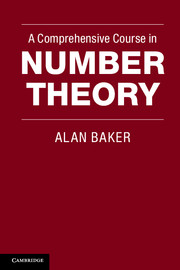Book contents
- Frontmatter
- Contents
- Preface
- Introduction
- 1 Divisibility
- 2 Arithmetical functions
- 3 Congruences
- 4 Quadratic residues
- 5 Quadratic forms
- 6 Diophantine approximation
- 7 Quadratic fields
- 8 Diophantine equations
- 9 Factorization and primality testing
- 10 Number fields
- 11 Ideals
- 12 Units and ideal classes
- 13 Analytic number theory
- 14 On the zeros of the zeta-function
- 15 On the distribution of the primes
- 16 The sieve and circle methods
- 17 Elliptic curves
- Bibliography
- Index
3 - Congruences
Published online by Cambridge University Press: 05 November 2012
- Frontmatter
- Contents
- Preface
- Introduction
- 1 Divisibility
- 2 Arithmetical functions
- 3 Congruences
- 4 Quadratic residues
- 5 Quadratic forms
- 6 Diophantine approximation
- 7 Quadratic fields
- 8 Diophantine equations
- 9 Factorization and primality testing
- 10 Number fields
- 11 Ideals
- 12 Units and ideal classes
- 13 Analytic number theory
- 14 On the zeros of the zeta-function
- 15 On the distribution of the primes
- 16 The sieve and circle methods
- 17 Elliptic curves
- Bibliography
- Index
Summary
Definitions
Suppose that a, b are integers and that n is a natural number. By a ≡ b (mod n) one means n divides b − a; and one says that a is congruent to b modulo n. If 0≤b<n then one refers to b as the residue of a (mod n). It is readily verified that the congruence relation is an equivalence relation; the equivalence classes are called residue classes or congruence classes. By a complete set of residues (mod n) one means a set of n integers, one from each residue class (mod n).
It is clear that if a ≡ aʹ (mod n) and b ≡ b′ (mod n) then a + b ≡ a′ + b′ and a − b ≡ a′b′ (mod n). Further, we have ab ≡ a′b′ (mod n), since n divides (a − a′)b + a′(b − b′). Furthermore, if f (x) is any polynomial with integer coefficients, then f (a) ≡ f (a′) (mod n).
Note also that if ka ≡ ka′ (mod n) for some natural number k with (k, n) = 1 then a ≡ a′ (mod n); thus if a1, …, an is a complete set of residues (mod n) then so is ka1, …, kan. More generally, if k is any natural number such that ka ≡ ka′ (mod n) then a ≡ a′ (mod n/(k, n)), since obviously k/(k, n) and n/(k, n) are relatively prime.
Information
- Type
- Chapter
- Information
- A Comprehensive Course in Number Theory , pp. 19 - 27Publisher: Cambridge University PressPrint publication year: 2012
